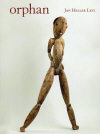Orphan
Orphan is an initially surprising title for Jan Heller Levi’s third collection of poetry, but after some thought, it strikes me as completely apt. While a few of the poems in the book relate specifically to the speaker’s parents, many others cast her as an orphan in other ways. The book opens with the poem “enter the tree” reproduced on the flyleaf inside the front cover. A brief eight-line poem, it describes “the snake” and “the woman”—a clear Garden of Eden reference to the original orphans, the sinners cast out of paradise by a sometime father; Levi’s woman, however, “doesn’t want what he’s offering // she just wants out / to see if there are other women / around.” This version of Eve is not a temptress or a victim, but a curious agent of her own destiny.
Orphan is an initially surprising title for Jan Heller Levi’s third collection of poetry, but after some thought, it strikes me as completely apt. While a few of the poems in the book relate specifically to the speaker’s parents, many others cast her as an orphan in other ways. The book opens with the poem “enter the tree” reproduced on the flyleaf inside the front cover. A brief eight-line poem, it describes “the snake” and “the woman”—a clear Garden of Eden reference to the original orphans, the sinners cast out of paradise by a sometime father; Levi’s woman, however, “doesn’t want what he’s offering // she just wants out / to see if there are other women / around.” This version of Eve is not a temptress or a victim, but a curious agent of her own destiny.
The image of the speaker as an outsider, a solitary presence, carries through into the book’s first three sections. The book proper opens with an epigraph from Muriel Rukeyser (whom Levi has studied and written on extensively) that asks, “Are there songs rising from the broken sources?” The answer of course, in Levi’s book, is yes. As humans, we are all broken, the book implies, yet all still capable of song.
The state of being broken is a theme taken up in various ways throughout the book, and one which the arrangement itself reflects. Structured in five unnamed parts, its organization seemingly lacks deliberateness and clarity. The poems themselves are powerful, and filled with humanity, honesty, and passion, but the book lacks a clear through-line.
The first section includes several poems about the speaker’s husband, whom she calls “the adventurer.” Although he is a wheelchair, the two enjoy traveling. In “Because we like the maps,” the speaker writes about the process of lifting him from his chair to get into the car:
Don’t
marry him, some good friends said.
Your life will be so circumscribed.
At the top of the lift, we’ve added a kiss
. . . a gentle
fuck you to anyone who’s watching
who thinks our life is less than theirs.
The speaker is not alone here, but she is sometimes separate. In “Unlucky,” for example, she writes of herself as “wanting to help, not able to help.”
The next two sections continue, in large part, the ideas of separation, of being orphaned in various ways. We find poems about the speaker’s parents in both sections, and about the poet Jane Cooper just before her death in two poems in the second section. Many of the other poems in these two sections center, in some fashion, on gender and family. Sometimes it’s bittersweet, as in “You Can Tell,” when the speaker meets a woman on the street who tells her fortune all too accurately. “I take my hand home, and my instant of believing,” the speaker says in the last stanza. “Okay, no kids, but I’m / going to live till I’m 80. And how / do you know I’m a woman? You can tell / by the way I’m smiling.” Other times, as in “Tributary,” there is nothing but the ache. The final line, set within dashes, in its own isolated stanza reads: “—I will leave this earth unblooded, blood related to no one—“
After the loss and loneliness of the second and third section, the book shifts rather dramatically into a fourth section of praise poems to six female poets, composed from a Google Books list of frequently used words in each poet’s work. The praise poems possess different styles, fitting to each poet: June Jordan, Muriel Rukeyser, Jane Cooper, Edith Sitwell, Emily Dickinson, and Levi herself. The inclusion of the writer in this list feels aspirational rather than arrogant, and the section as a whole reads as a celebration of women writers and as a way of finding a connection that goes beyond blood. The Jordan poem ends, “Walk through the walls. Be a woman, be women.” And Rukeyser’s poem concludes with the line, “Trees are turning into voices, waking women into waves.” This is by far the most cohesive section of the book and would’ve provided a lovely sense of closure had it been the final one.
The book doesn’t end there, however, but continues on to a numbered multi-part poem called “lo yang,” after the gate at which Lao Tzu wrote The Tao. In both subject and style, this section seems almost to be part of a different book, which is not to say that the writing is less accomplished, simply that it didn’t seem fully connected to the rest of the book.
Overall, Orphan is a collection of strong poems, of honest emotion, and in spite of its title and the loneliness that’s present in many places, it is a collection that sings.





